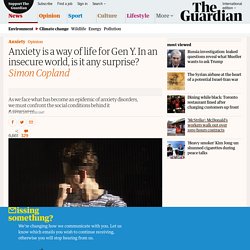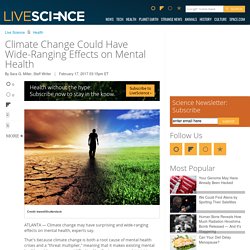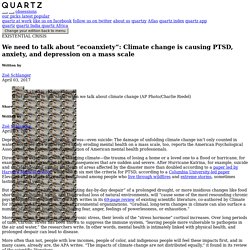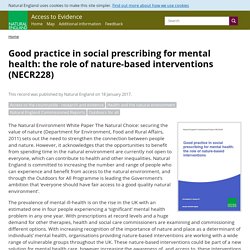

This is being linked not just to socio-economic changes (less job security, housing stress, economic and income instability) but also to climate change and environmental destruction, and associated conflicts.
Implications: Environmental and climate policy should take into account mental health aspects.
Relations to EEA Global Megatrends:
Influences:
GMT 9: Increasingly severe consequences of climate change
Influenced by:
GMT 7: Intensified global competition for resources
GMT 8: Growing pressures on ecosystems
GMT 9: Increasingly severe consequences of climate change
GMT 10: Increasing environmental pollution
Scanners: Tara Higgins & Miroslav Havránek
First entry: 2018/05/01
Last update: 2018/05/01.
Anxiety has become a way of life for my generation. In an insecure world, is it any surprise? It always hits me in the gut first.

I often feel it first thing, my stomach twisted in a knot, my brain deciding it doesn’t want to deal with the day before I even wake up. Sometimes my anxiety will fester around a particular thing – a cascade of worry about my work, health, social life, or often a simple decision I have to make. This worry becomes totally paralysing, with hours spent focusing on nothing else but this one issue. At other times the anxiety hits for no reason, a desperate feeling of dread that I cannot explain, nor wash away no matter how much I try. Over the past couple of years I’ve come to terms with the reality of my anxiety disorder – moving from seeing myself as someone who has anxious moments to realising I have a mental health condition. In many ways it has been liberating, largely because in owning the illness I’ve been able to start dealing with it.
I’ve managed to understand this by thinking about anxiety as a stressful event. But herein lies the challenge. Why Climate Change Is Bad For Your Mental Health. Climate Change Could Have Wide-Ranging Effects on Mental Health. ATLANTA — Climate change may have surprising and wide-ranging effects on mental health, experts say.

That's because climate change is both a root cause of mental health crises and a "threat multiplier," meaning that it makes existing mental health problems worse, said Dr. Lise Van Susteren, a psychiatrist in private practice and an advisory board member for the Center for Health and the Global Environment at the Harvard T.H. Chan School of Public Health. Van Susteren spoke about the connection between climate change and mental health yesterday (Feb. 16) here at the Climate & Health Meeting, a gathering of experts from public health organizations, universities and advocacy groups that focused on the health impacts of climate change. [5 Ways Climate Change Will Affect Your Health]
"Ecoanxiety": the American Psychological Association says climate change is causing PTSD, anxiety, and depression on a mass scale. Depression, anxiety, grief, despair, stress—even suicide: The damage of unfolding climate change isn’t only counted in water shortages and wildfires, it’s likely eroding mental health on a mass scale, too, reports the American Psychological Association, the preeminent organization of American mental health professionals.

Direct, acute experience with a changing climate—the trauma of losing a home or a loved one to a flood or hurricane, for example—can bring mental health consequences that are sudden and severe. After Hurricane Katrina, for example, suicide and suicidal ideation among residents of areas affected by the disaster more than doubled according to a paper led by Harvard Medical School, while one in six met the criteria for PTSD, according to a Columbia University-led paper. Elevated PTSD levels have also been found among people who live through wildfires and extreme storms, sometimes lasting several years. Good practice in social prescribing for mental health: the role of nature-based interventions - NECR228.
The Natural Environment White Paper The Natural Choice: securing the value of nature (Department for Environment, Food and Rural Affairs, 2011) sets out the need to strengthen the connection between people and nature.

However, it acknowledges that the opportunities to benefit from spending time in the natural environment are currently not open to everyone, which can contribute to health and other inequalities. Natural England is committed to increasing the number and range of people who can experience and benefit from access to the natural environment, and through the Outdoors for All Programme is leading the Government’s ambition that ‘everyone should have fair access to a good quality natural environment’. The prevalence of mental ill-health is on the rise in the UK with an estimated one in four people experiencing a ‘significant’ mental health problem in any one year.